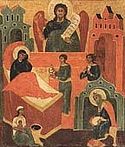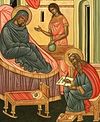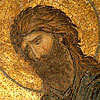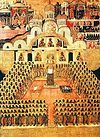

| Previous day | Next day |
| Old Style
February 24
|
Sunday |
New Style
March 8
|
|
First Sunday of Great Lent.
Tone 5.
Great Lent. |
Wine and oil allowed.
|
First (4th c.) and Second (452) Findings of the Precious Head of ![]() St. John the Baptist.
St. John the Baptist.
St. Erasmus of the Kiev Caves (ca. 1160). Uncovering of the relics of (1486) St. Romanus, prince of Uglich (1285).
Martyrs Montanus, Lucias, Julian, Victoricus, Flavian, and their companions, at Carthage (259). St. Cummain Ailbe, abbot, of Iona (669).
Thoughts for Each Day of the Year
According to the Daily Church Readings from the Word of God
By St. Theophan the Recluse

The First Sunday of Lent. [Heb. 11:24–26, 32–12:2; John 1:43–51]
The Sunday of Orthodoxy.[1] Do not forget the right word[2] which you spoke to God, renewing your testament with Him which you broke through your negligence. Remember how and why you broke it and try to avoid being unfaithful again. Pretty words are not glorious; faithfulness is glorious. Is it not glorious to have a testament with a king? How much more glorious is it to have a testament with the King of kings! But this glory becomes your disgrace if you are not faithful to this testament. How many great people have been glorified since the beginning of the world! And all of them have been glorified for their faithfulness, in which they stood firm, regardless of great misfortunes and sorrows as a result of this faithfulness. They had trial of cruel mockings and scourgings, yea, moreover of bonds and imprisonment: They were stoned, they were sawn asunder, were tempted, were slain with the sword: they wandered about in sheepskins and goatskins; being destitute, afflicted, tormented; Of whom the world was not worthy: they wandered in deserts, and in mountains, and in dens and caves of the earth…. Wherefore, seeing we are compassed about with so great a cloud of witnesses, let us run with patience the race that is set before us, looking unto Jesus the author and finisher of our faith (Heb. 11:36–38; 12:1–2).
[1] The first Sunday of Great Lent is called “The Sunday of Orthodoxy,” and celebrates the restoration of the veneration of Icons and the victory of Orthodoxy over the Iconoclast heresy.
[2] “The right word” is a reference to the meaning of the word “Orthodox” in Russian, which is literally “rightly glorifying.”
Articles
 Nativity of the Holy Glorious Prophet, Forerunner and Baptist, John |
 Triumph of Orthodoxy SundayFr. Thaddaeus HardenbrookAfter the exercise of Clean Week, the wisdom of the Church grants us a rest in the joy of Triumph of Orthodoxy Sunday. |


























